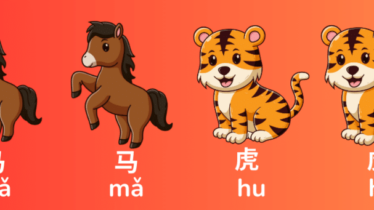Wie sagt man "mit" auf Mandarin-Chinesisch?
Many elementary level Chinese learners will ask about learning Mandarin: “How can I say “with” in Chinese? For example, how to say ‘I went to a bar with my friends yesterday’?”
Most Chinese language teachers tell you to use “hé(和, and)”. It’s good enough for class, but not perfect. Let’s find out why.
Generally speaking, students want to express “with” in these two situations:
- With someone: I went to a bar with my friends yesterday.
- With a tool: I can eat with chopsticks.
Two different usages of ‘with’
If you say “with someone” you should use gēn (跟, with):
- I went to a bar with my friends yesterday. (with someone)
- 昨天我跟我的朋友去了酒吧。
- Zuótiān wǒ gēn wǒ de péngyǒu qùle jiǔbā.
Please note that gēn should be immediately after the subject. It can’t be at the end of a sentence like English.
If you say “with a tool” you should use “yòng (用, to use), not gēn(跟, with).
- I can eat with chopsticks.
- 我会用筷子吃饭。
- Wǒ huì yòng kuàizi chīfàn.
For elementary level Chinese language learners, this is all you need to know about using “with” in the Chinese language.
Can you use “with” correctly?
How to say these sentences?
- I’ll buy a lot of stuff with my boyfriend tomorrow.
- I don’t want to work with him. I don’t like him.
Scroll down to find out.
Correct answers:
- 我明天要跟我男朋友去买很多东西。
- Wǒ míngtiān yào gēn wǒ nán péngyǒu qù mǎi hěnduō dōngxī.
And:
- 我不想跟他一起工作。我不喜欢他。
- Wǒ bùxiǎng gēn tā yīqǐ gōngzuò. Wǒ bù xǐhuān tā.
Hope that helps clarify how to use ‘with’ in Chinese!




